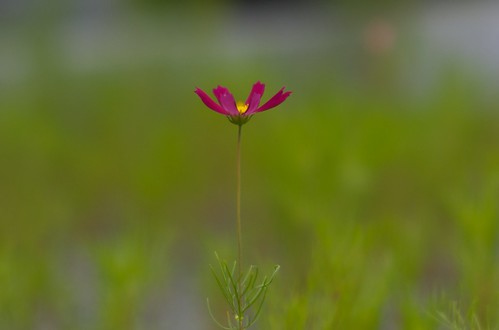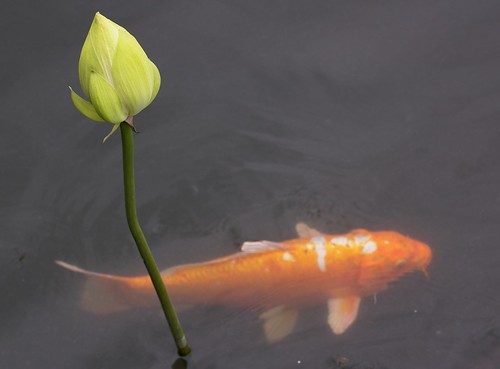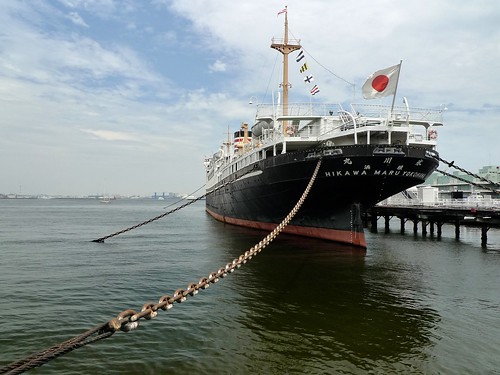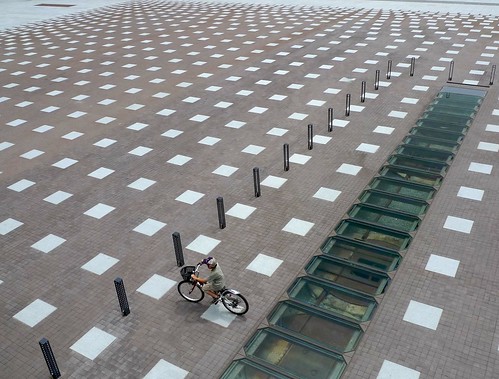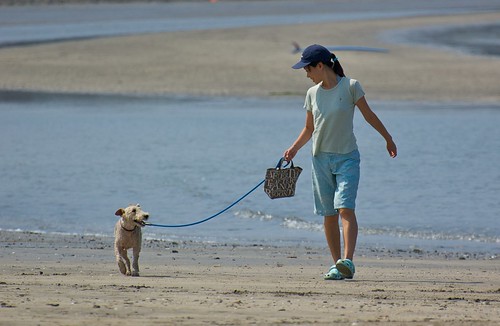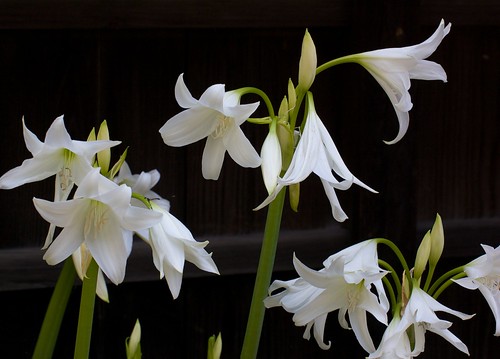This is an incredibly cute baby praying mantis (kamakiri), found halfway up the wall inside our house. I wonder how old it might be - really it can be only just hatched to be so tiny. Hopefully, later in the year, I'll be able to show you how big they get.
[Now this IS macro... courtesy of James' Panasonic LX3. I artificially sharpened this image, since sitting on James' massive fingernail it shows the scale better than the shots which actually were in focus.]
Friday, July 31, 2009
Wednesday, July 29, 2009
The first rule of living in Japan is never turn down an invitation from an American or Australian to share meat they are cooking. Not only do they know how to BBQ properly, but they also are mysteriously able to obtain ingredients (beef mostly) that the rest of us can only dream about.
[photo taken on location in deepest hottest Tokyo]
Tuesday, July 28, 2009
This weird picture was created by accidentally using the defocus control ring (at maximum defocus!) on Lan's lens. But the result has kind of grown on me...
[Taihoji is a very small temple in Kamakura]
Friday, July 24, 2009
Delightfully, someone called Chuck commented on a couple of my photos! :-) Not on this blog, which remains as silent and unvisited as ever, but over at James' Empty Blog.
Chuck said he liked my macro shots, so it must be time to share my latest investment in Japanese technology. None of the shots are actually real macros, but are taken with one of these. (The link is to mapcamera, the lovely shop in Shinjuku where I bought this lens second-hand, but in perfect condition). Basically the "close-ups" are taken with this lens, zapped out to a focal length of 300mm where at 5 feet minimum focus distance it produces a maximum magnification of only 1:4. Lucky that Japanese insects and flowers are so big! Having to be 5 feet away makes things difficult, or impossible, sometimes in tortuous Japan where one step backwards can throw you into a pond or down a cliff, across a road, or cause you to tread on someone's toes, but it is probably a good thing when it comes to trying to not scare the creepy crawlies. Today's photo of Hachimangu pond is taken at the other end of the zoom range at 75mm. ...that goldfish, might look like the one in your fish tank at home but is actually about 1.5 feet long.
What I am not sure about is whether this lotus and fish or this fish and lotus. are nicer. Perhaps they are both just shite.. that is usually the way when I can't decide between two pictures. :-)
Thursday, July 23, 2009
A white lotus growing in the ponds of Hachimangu has been featured for years at the top of our website. This year lotus season has been windy, making finding such an elegantly shaped specimen quite tricky. This relatively sheltered pink lotus is one of many growing in large pots at Kenchoji, Kamakura. The gate in the background is a particularly good one and has been designated an "Important Cultural Property".
Read more...Wednesday, July 22, 2009
If I made up the ranking for the temples, only temples with cats would be considered for the top ten. I discovered yesterday why everything is ranked in Japan, when we mentioned Kamakura to some work colleagues and they instantly responded in unison that "Kamakura has five great temples", although, happily, they struggled to name them. This was, of course, one of the "facts" they were taught during their formative brainwashing years. Actually, the brainwashing can come in handy occasionally in meetings, when you want to know something like, say, the position of some obscure element on the periodic table. When the internet finishes there will be at least one nation on the planet whose still remembers things, even if those things are not all entirely true.
[Do not adjust your monitors. This cat is not quite in focus. She lives at Zuisenji in Kamakura. Please tickle her behind the ears if you visit]
Monday, July 20, 2009
One pleasant side effect of the mozzies, is the dragonflies. Apparently their habitat is being degraded in the Yokohama area. Not surprising since everyone's habitat is degraded by the slathering of concrete over every available square inch of ground. I wonder when, if ever, the concretification will stop. It is so pointless.
Read more...Thursday, July 16, 2009
To top it all off, the amorphous hydrangea have an incredibly long season. Still flourishing in places, it is more than a month since they were mankai (full bloom) at Megetsuin. Their death knell was, however, tolled this week when it was officially announced that rainy season has ended and summer has started. The Japanese seasons are quite confusing - our summer doesn't start until the evenings are already drawing in. This year the start of summer has been abrupt. From overcast, warm and ridiculously humid, we have now switched to blue skies, hot (today's range forecast to be 25C-31C) and slightly less humid.
[photo taken near our house in Kamakura]
Tuesday, July 14, 2009
The Kobayashi Maru may have a bigger Wikipedia entry, but the Hikawa Maru actually did stuff in our universe.
Read more...Monday, July 13, 2009
While Kamkura ocean-life is all about the beach, Yokohama ocean-life is all about the port. It was at Yokohama that Japan re-opened to the rest of the world and this year is the 150th anniversary of the port opening. To celebrate the 150 years, they have done some more organising of the old port area. The bit under the glass is the remains of a railroad turntable in the vicinity of the old customs house. The gaijin history of Japan part 2 really starts a few years earlier than 1859, in 1853 when the Americans arrived. The Japanese have done a remarkable job over the intervening 150 years of not absorbing American, or any other foreign culture. The root of this unique ability seems to be the belief, instilled somehow in all, that foreigners are a kind of alien species that can, by definition, never be understood. Likewise the belief is that Japanese are (culturally, mentally, and even physically) unique and likewise can never be understood by any foreigner.
Read more...Saturday, July 11, 2009
Thursday, July 9, 2009
Wednesday, July 8, 2009
A bit like in the UK, where it is rare to find the fluffy red squiggle, and the American import is more common, Japan's own fluffy squiggle is much less common that this one, who, I have been told, was developed in Taiwan...
[photo taken near the Daibutsu in Kamakura]
Tuesday, July 7, 2009
Engagkuji is the second of the top five zen temples in Kamakura. Don't know how these lists are worked out, but they seem to be invented for most things you might go and visit in Japan. It starts to get a little mind bending when you find yourself visiting the third of the top ten outside the top five somethings. Anway, Engagkuji is huge and monochrome.
Read more...Friday, July 3, 2009
Kamakura, these days a peaceful retreat from Tokyo, endured a great deal of murder (tribal warfare) back when it was the capital of Japan. Jojuin marks the "mountain" pass that was the westward guarded entrance to the town, so I expect it saw its fair share. Nowadays it has alleys of ... yes ... ajisai (sigh) running up the steep sides of the hill. The temple, itself, however, has a lovely little garden including some lillies of a more understated nature than the weed variety.
Read more...Thursday, July 2, 2009
Another plain weed, and the common ole buppyfly that's the size of a swallow. You might need to look at the larger size image to see the pollen on the butterfly's wings that is getting rubbed into all the right places.
[photo taken near our house in Kamakura]
Wednesday, July 1, 2009
Only a 10 minute bike ride from home and just 200¥ for a "worship ticket", the Kamakura Daibutsu is a National Treasure. At lesser temples, the staff Zen-ishly sweep the gravel and flagstones in the early morning. At the Daibutsu, however, they have invested in a leaf blower. Unbelievable Noise Pollution! We took several photos, but this one got the most hits on flickr so its reward is to be blogged.
Read more...

